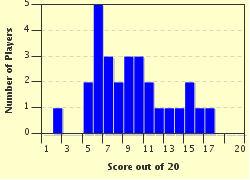Quiz Answer Key and Fun Facts
1. This first Greek is from the Heroic Age and may or may not have existed, but he is considered one of Athens' founders. He defeated King Minos'Minotaur and fought with the Amazons. Who is this legendary Athenian?
2. I gave Sparta its laws, the Great Rhetra, which made it a great military power and one of the most stable city-states in Ancient Greece. Who am I?
3. This Athenian was Archon for only one year (594-593B.C.), but his economic and political reforms were far reaching and set Athens on the path for democracy. Who is he?
4. I am considered the Father of the Athenian Navy and the victor at Salamis in 480 B.C. Who am I?
5. This brilliant but erratic Athenian, and nephew of Pericles, was the inspiration for Athens' disastrous expedition to Sicily in 415 B.C. Who was he?
6. I am a Corinthian and let my brother die because he had become a tyrant. I left politics as a result, but later gave freedom to the people of Syracuse. Who am I?
7. Plutarch's biography about this Theban statesman and general who freed his native city of Spartan dominance and was instrumental in establishing the brief Theban Hegemony of 371-362 B.C. survived. Who is he?
8. I was associated with the aristocratic faction of Athens and served at the Battle of Marathon as a strategos(general)and later as Archon in 489-488 B.C. I ended up being ostracized in 482 and forced from Athens for opposing Themistocles' plan to use the silver at Laurium for a navy. Who am I?
9. This Megalopolitan lived from 252-182 B.C. and was strategos repeatedly for the Achaean League of the Peloponnesus. He implemented military reforms making the League stronger. Who was this "last of the Greeks"?
10. This Epirot had a long and storied career as a soldier and King of Epirus. At one point he invaded southern Italy in 279 and defeated two Roman armies at Heraclea and Asculum. Who was this warrior-king?
11. I am the Spartan navarch(admiral) who engineered the Persian alliance and defeated the Athenian navy at Aegospotami in 405,securing victory for Sparta in the Peloponnesian War. Who am I?
12. This Athenian statesman lived from 510-451 B.C. and was strategos numerous times. His greatest victory was the naval battle at the Eurymedon River over the Persians in 466. Who is he?
13. This Athenian statesman was known for his piety and patriotism during the Pelponnesian War. Unfortunately he was incredibly indecisive at key moments during the Sicilian Expedition of 415, and this indecision led to a strategic disaster for Athens. Who was he?
14. This Greek was Alexander the Great's personal secretary throughout the latter's conquest of the Persian Empire. But he would play a bigger military role in the Successor Wars after the death of Alexander. Who was he?
15. This Spartan king came to the throne in 399 B.C. at the height of Spartan power, with the help of Lysander. He was in Asia Minor prosecuting a war against Persia when he was re-called to fight the Corinthian War against Thebes, Athens and Corinth. He was known for his unremitting hostility towards Thebes, and the fruits that this policy would bear later in the century.
16. This student of Plato lived from 402-318 B.C. and was elected strategos of Athens an amazing forty five times. His main headache was that much of his time in office came during Macedon's dominance of Greece, and he had to walk a fine line between the greatest military power of the day and the often radical demos of his city. Who was he?
17. I ruled Sparta from 235-222 B.C. and attempted to reform my city and make it great again. Ultimately I failed and was defeated at Selassia by the Macedon-Achaean alliance in 222. Who am I?
18. This Athenian is considered to be one of the great orators of all time. Beginning with Phillip II of Macedon, he thundered over and over again that Athens must fight Macedonian efforts to dominate Greece. His implacable resistance to Macedon would ultimately be his undoing in 322 B.C. Who is he?
19. I advised the Syracusan tyrants Dionysus the Elder and his son Dionysus the Younger in the first half of the Fourth century, and brought my friend Plato to my city to teach them how to be better rulers. In the end I ended up a tyrant myself. Who am I?
20. I am a citizen of Sicyon and pursued a policy for years of supporting democracy in the Peloponnesus and resisting Macedonian interference as the leader of the Achaean League in the second half of the Third Century. Who am I?
Source: Author
Craterus
This quiz was reviewed by FunTrivia editor
bloomsby before going online.
Any errors found in FunTrivia content are routinely corrected through our feedback system.

